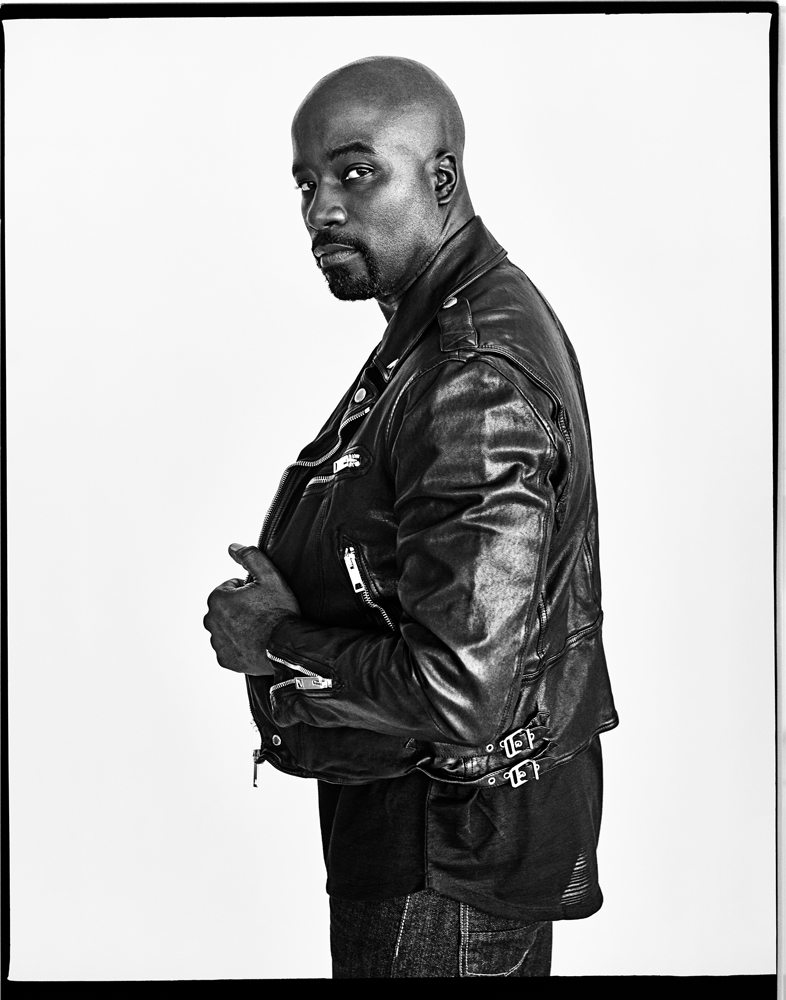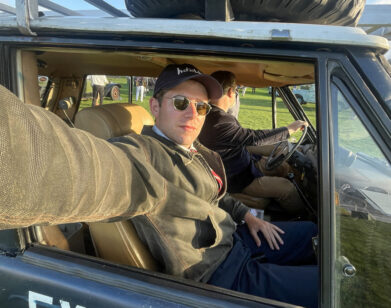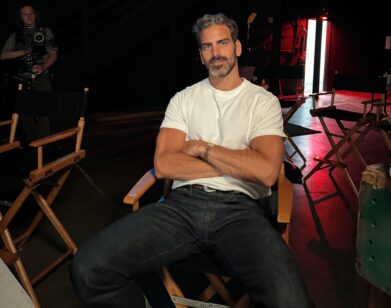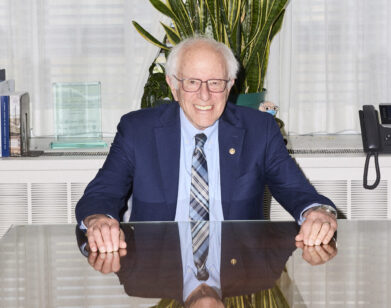The Making of a Superhero
MIKE COLTER AT RR DONNELLY’S DSG STUDIO IN NEW YORK, SEPTEMBER 2016. PHOTOS: DAVID NEEDLEMAN. STYLING: JOSHUA LIEBMAN/HONEY ARTISTS. GROOMING: LAURA DE LEON/JOE MANAGEMENT USING CHANEL.
“Luke is one of the more redeeming characters that I’ve played,” explains actor Mike Colter, star of Netflix’s new superhero drama Luke Cage. “He has his issues, but for the most part he’s a no-B.S. kind of character. He’s a straightforward kind of guy, and he doesn’t take a lot of nonsense, doesn’t suffer fools,” he continues. “I think there’s a lot of places we can go with him and I hope to develop him even more.”
With Luke Cage, which is available on Netflix as of today, Colter helms a powerful cast, featuring Alfre Woodard and Mahershala Ali as the villains to his troubled hero. That Colter feels an certain affinity for his character is important—between the stand-alone series, last year’s Jessica Jones, and next year’s Jessica-Luke-Daredevil crossover series The Defenders, he’s going to be playing him for quite a while. “Acting, really, is a lot of mental fatigue, emotional fatigue, concentration … it’s mentally draining,” Colter says. “You have to be ready when the time comes and you have to keep a keen mental focus.”
Raised in small-town South Carolina, Colter studied theater at the University of South Carolina and received an MFA in acting from Rutgers’ Mason Gross School of the Arts. Until last year, his career has gone in fits and starts: He saw some success when he played boxer Big Little Willie in Clint Eastwood’s Oscar-winning drama Million Dollar Baby, but the roles he was offered as a result were disappointing. When he starred in A Soldier’s Play off-Broadway opposite Anthony Mackie, Taye Diggs, and James McDaniels in 2005, The New York Times deemed him “the find of the production.” He’s had arcs on popular television shows like The Good Wife, American Horror Story (he was in the second season, Coven), and The Following, but there have also been some one-season-only disappointments, such as the CW’s Sarah Michelle Gellar-starring, identical-twin soap Ringer.
In the end, however, these ups and downs only make it easier to root for the 40-year-old actor. There is something incredibly satisfying about an actor who has been patient and persistent, and finally has it pay off. “I’m optimistic,” says Colter. “I think I’ve just gotten started with my career. It’s always very exciting to think about the future in regard to endless possibilities.”
EMMA BROWN: Are your parents at all artistic?
MIKE COLTER: My mother wanted to be an actress. She wanted to follow her dreams and she never really got a chance to do that. I feel like I’m following her dream in a way. She’s proud of me for doing what I wanted to do, but at the same time, I’m kind of taking up where she left off. She wanted to go to New York, and she did, but then her mother became ill and she had to move back home. So I feel like in some way, shape, or form, I’m taking on that legacy.
BROWN: Did you act in school plays?
COLTER: Yeah, I started in high school and basically started my own drama club with my English teacher. We did these monologues in class from Shakespeare plays. Then we got the idea, “Can we stage a play?” We didn’t have a budget because there was no drama club, so we basically found some other interested people and I talked some people into the drama club who probably didn’t even think about it—people I just knew. It became about 10 people. We didn’t have money for costumes, so I would just borrow clothes and use what I had. I remember I wanted to play this one role and I borrowed items from everyone who I knew. I literally walked around school going, “Can I borrow this? Can I borrow that?” Then the whole school—it wasn’t a large school, there were probably about 600 kids—showed up and they saw the play, a one-act play. We had a tremendous reception, I felt like a rock star. I was like, “What a reception for doing something that I really love and feel passionate about.” I think that’s when it hit me: “This is it. This is what I want to do.”
BROWN: Were you happy that you then got a formal theater education in college and graduate school?
COLTER: It was my way of getting a foothold in the business, or at least an entry into the world. I didn’t have any kind of familiarity with theater; I was basically an outsider. I thought the best way to do it would be the collegiate way, to approach the work from the standpoint of education. Get a degree in it, meet some people who have been out in the world who have some experience, and go from there. I met some people in college and I kept cracking away until someone pointed me in the right direction.
BROWN: What was your first paid role?
COLTER: That was probably a play that I did in Columbia, South Carolina. I don’t remember what I got paid; it was very small. I guess these guys were Equity members, semi-professionals. I played a supporting role in The Merchant of Venice. I was just happy to be around professionals. They had been out and traveled the country; some had gone to Europe. They had experience. I was happy to be in the midst of that kind of environment because I felt like I was making progress. They were working for a local theater, but that was their life, their livelihood, their occupation. Some of them had part-time jobs, which they supplemented their income with. Some of them worked for the theater and traveled around and lived like gypsies; they had an apartment here and there and they came to town to do a play. It was really exciting. I was still going to university at the time and so for me it was like, “I’m rubbing elbows with people who actually have done this for a living.” I felt like I belonged.
BROWN: Is that how you got your Equity card?
COLTER: I didn’t get my Equity card probably until I did an off-Broadway play at Second Stage Theatre. I got the card, but I had my heart set on doing more TV and film. I was fixated. I had a taste of what it was like to travel doing regional stuff. I didn’t really like getting on the road, doing the play in some part of the country, then coming back to New York, getting another play, and going out again. I really wanted to be on television and film.
After graduate school I moved to upstate New York and I did this little Shakespeare play in which I got to be the lead for a change. I got to play Henry V. I was [also] Oberon in A Midsummer Night’s Dream, both roles for the summer. I thought, “This is good. I want to get the chance to play the lead in something before I go to L.A.” I was in a hurry to get to L.A. because that was where I thought I needed to be. So I did the play in New York and then I drove out to L.A. and hit the trail. I had an agent and spent a year out there. Then I moved back to New York because I needed to allow my wife to complete her doctorate. That kind of interfered with my plans, but it all worked out.
BROWN: Did you get auditions right away in L.A.?
COLTER: I got auditions right away, but that’s the thing about it: when you’re new to the business, you don’t even realize. Auditions are great, and you definitely want to continue to make progress as an actor, you want to continue to see some advancement in your career. But when you get out there, you don’t realize how many auditions you have to go on before you actually get work. So I had to get a day job and find ways to make ends meet. I had to do the actor’s struggle for a while. I would get callbacks; I would go in for producers. I was always close but no cigar. Then I finally got a job, like, three months after I got there. It wasn’t what I expected. I was like, “I’m going to audition and then I’m going to get a job.” It doesn’t work that way.
BROWN: Was Million Dollar Baby a big turning point in terms of your career?
COLTER: I would like to think it was, but it really was just scratching at the surface. The movie was a big success, but my supporting role in it didn’t mean that I was going to get offers right away. The things that I did get offers for or interest in were more athletes or things of that nature. I was really adamant about not doing that. I didn’t think that that was really what I was good at and I didn’t want to get into that niche of, “He’s an athlete, big guy. Get this guy.” That wasn’t me. I worked out for the role. I had never boxed and I had never wanted to box. I wasn’t really an athlete per se; I played the part. I wasn’t interested in playing another boxer. I think when you experience something like Clint Eastwood—that level of work—you’re spoiled a little bit because you get the chance to work with someone who’s profoundly talented and gracious and giving. When you’re on that kind of production surrounded by those kind of people, you don’t want to have other experiences, you want everything to be like that. I was really young, so it was really hard to get around, “That’s a great start to a career, now what do I do next?” Everything else seemed like it didn’t make sense. It took a while for that thing to wear off. I had to be realistic and understand that’s not how things work.
BROWN: What was the first role after Million Dollar Baby where you were like, “I feel creatively fulfilled”?
COLTER: It was a dry-spell. My agents and I were bickering. We didn’t have the same idea about what we should be doing going forward. There was a little bit of fingerpointing in that they thought I should be going out for this and I was trying to talk to them and understand what I saw for myself. So we weren’t seeing eye-to-eye. I was working in a restaurant and I knew that I was able to support myself as an actor waiting tables. I was not going to just do whatever because I wanted to be a full-time actor. I was willing to struggle and wait tables because I wasn’t sure that whatever they were trying to fit me in was where I wanted to be.
I kept on sticking to my guns and the play came along—a play called A Soldier’s Play, which, oddly enough, was one of the film adaptations I had seen on HBO when I was a kid. They were looking for this character called C.J. Memphis, and I thought that was a really good role for me. By the time I found out about it, they had been looking for a while and hadn’t found anyone. It was an important role; the only problem was that the guy had to play the guitar. He was a blues guitar player. He was a good athlete and he played baseball but he was a guitar player. He was really a country boy—all these things that I think I related to but, at the same time, the guitar playing I did not relate to. I had no experience. I remember I walked into the audition and there must have been at least a dozen people who all had guitars. They were playing and warming up. And not only do I not play, I didn’t even bring one, so I was already looking really odd, not feeling so sure about myself in that regard. But there was something [about it] that I was like, “This is me. This has got to be my role.” I just felt it in my bones. I had a great read, great audition. The director came back a couple of days later and we talked some more. I remember having to do some acapella singing because I didn’t have a guitar, and he just looked me in the eyes and said, “Can you pull this off, can you play the guitar? We open in less than two months. Can you learn these songs? Do you have dexterous hands?” This is a typical actor’s thing, [but] I said, “Sure, 100%. Absolutely. I can do this.” You’re young; you do stuff like that because you just don’t know any better. You just say whatever it takes to get a job. I did feel like I could, but as soon as he said “Okay” and I walked out, that’s when it hit me: “What have I gotten myself into?” I got two guitars on Craigslist. I went to the guitar store and I got the picks to play and the different ways to tune it. I lost sleep at night: “If I don’t do this and it doesn’t turn out well, I’m going be ruined!” New York City is a big city, but a small city when it comes to theater. So I had to figure a way out.
I remember a guy named Steve was sent to help get me ready. He was a classically trained guitar player from Juilliard and he was great. I couldn’t read sheet music and he broke it down for me in the simplest way he could and we started working on trying to get these songs. I needed to learn three songs. It was overwhelming. He played guitar his whole life and he was like, “I’m going teach you, but I’m not going to lie to you. It’s going to be very difficult and to sing and play at the same time is going to be even harder. I don’t sing and play at the same time!” That scared the you-know-what out of me. Fast-forward six weeks later, days before we opened, it finally all sank in: the singing, the playing. It was like rubbing your stomach and patting your head at the same time. All of it fell together just in the previews. I don’t know how it happened, but it finally fell together. I got great reviews and it opened up the doors for me in New York City.
BROWN: When you get a Marvel audition, what do they give you? Are you even told what it is?
COLTER: When you’re casting, you get a page or two—just enough to do the scene. Now that you’re in the world, you get the whole script. You don’t get it in your hand all the time—sometimes they give you a physical copy, but they also have this unique system that they use. You have to have a password—I can’t even remember my password—and put it in and read it from there. If I don’t continuously read it, it will close down on me within a matter of two or three minutes. It’s very secretive and security’s very tight.
BROWN: So when you first got the audition what did your agents say? Were they like, “It’s a Netflix project” or, “It’s a Marvel project”? Or was it just, “Do this. Trust me”?
COLTER: I saw Marvel and I saw Netflix. I had heard about these things going on. I had heard about Daredevil vaguely. I read the trades and I keep up with stuff, but I didn’t know anything specific about it. I wasn’t familiar with the characters that we were going to portray, so all of it was new to me. I just responded to the material. It wasn’t something I had foreknowledge of.
BROWN: Was it a quick process or did you have to do 16 screen tests?
COLTER: Relatively quick. I did a few takes, a few readings. I was put in with different women, Krysten Ritter being one of them, to see how the chemistry was and how we worked off of one another. Then the offer came and I was in a project already and I had another contract. Those producers were gracious enough to realize what kind of opportunity this would be for me and gracious enough to let me out of the contract. It took a lot of finagling on their part, but I’m forever grateful to them for doing that because they didn’t have to.
BROWN: When you got the offer, was it just for Jessica Jones or did they mention The Defenders and Luke Cage as well?
COLTER: We found out right away. Obviously there was contractual language that told us how it would play out. There were always options, because if things are not working out, they just stop going forward. That’s how this business is. It’s all good until it’s not good and they change their minds. So there were contingencies and things, but I knew it was a possibility that it was going to be three series from the start. [But] I knew I had to think about Jessica Jones first and then the rest would come, if at all. I couldn’t get ahead of myself.
SEASON ONE OF LUKE CAGE IS AVAILABLE ON NETFLIX AS OF TODAY, SEPTEMBER 30, 2016.







